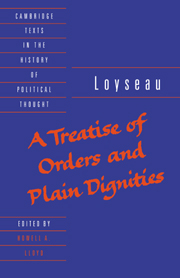Book contents
- Frontmatter
- Contents
- Acknowledgements
- Introduction
- Principal events in Loyseau's life
- Bibliographical note
- Note on translation and citations
- List of abbreviations
- Biographical notes
- Dedicatory epistle: Charles Loyseau to the Honourable Jean Forget
- Preface
- 1 Of order in general
- 2 Of the Roman orders
- 3 Of the order of the clergy
- 4 Of the order of nobility in general
- 5 Of plain gentlemen
- 6 Of the high nobility
- 7 Of princes
- 8 Of the third estate
- 9 Of solemn deprivation of order
- 10 Of the plain dignities of Rome
- 11 Of the plain dignities of France
- Index
- Title in the Series
10 - Of the plain dignities of Rome
Published online by Cambridge University Press: 05 June 2012
- Frontmatter
- Contents
- Acknowledgements
- Introduction
- Principal events in Loyseau's life
- Bibliographical note
- Note on translation and citations
- List of abbreviations
- Biographical notes
- Dedicatory epistle: Charles Loyseau to the Honourable Jean Forget
- Preface
- 1 Of order in general
- 2 Of the Roman orders
- 3 Of the order of the clergy
- 4 Of the order of nobility in general
- 5 Of plain gentlemen
- 6 Of the high nobility
- 7 Of princes
- 8 Of the third estate
- 9 Of solemn deprivation of order
- 10 Of the plain dignities of Rome
- 11 Of the plain dignities of France
- Index
- Title in the Series
Summary
1. I call plain dignities all the titles and qualities with which one can be titled and qualified solely by honour without their being in effect true orders, offices or lordships.
2. Now there are two kinds of them: to wit, honorary dignities which are plain titles of honorary orders, offices or lordships, and ‘held by title’, but otherwise without performance or practice or reality; and epithets of honour, that is, the honourable qualities ascribed to every dignity, whether order, office or lordship.
3. And there is this difference between them: that an honorary dignity is a substantive name ascribed immediately to the person and because of himself; and an epithet is an adjectival name ascribed mediately to him because of some real dignity of order or of office or of lordship.
4. Let us begin, according to our custom, with the custom of the Romans. Let us speak first of their honorary dignities, then of their epithets. For, as they had only two kinds of dignities, to wit, orders and offices, and did not have the use of lordships, it is true that they had various orders, and above all various honorary and nominal offices.
5. As for orders, first they had nominal senators: to wit, all those who had exercised great offices, called ‘curule magistrates or magistrates of the Roman people’, and thereafter had entry and voice in the senate and had also the senatorial ornaments, so that only the name of senators remained any longer to them.
- Type
- Chapter
- Information
- A Treatise of Orders and Plain Dignities , pp. 202 - 221Publisher: Cambridge University PressPrint publication year: 1994



